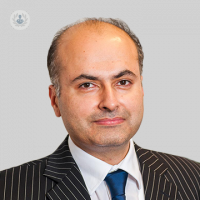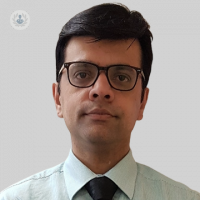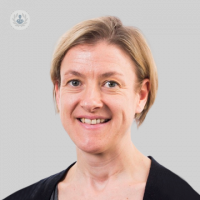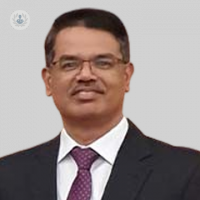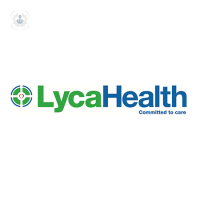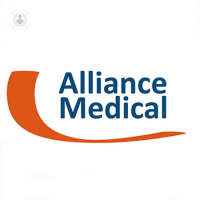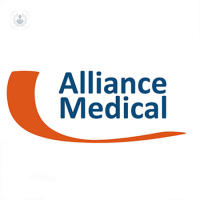What is it?
A chest CT scan is a radiological exam which produces detailed images of the bones and tissues inside your chest. It can be done with or without contrast medium, a liquid which gets clearer images from the scan.
What does it involve?
During the chest CT scan, you will be asked to lie down on a flat bed that passes into the CT scanner. It is important that you stay as still as possible in order to get a clear image. The scan takes around 5 minutes. The information gathered during the CT scan is then visualised by a computer. A CT scan is performed by a radiologist.

What is it for?
A chest CT scan is usually carried out when your doctor wants to verify whether or not there are any conditions which won’t show up properly on an X-ray scan. This scan is often recommended in case of:
- inflammatory disease (such as asthma)
- bronchitis that is unresponsive to treatment
- lung infections, such as pneumonia, pleurisy and tuberculosis (TB)
- lung autoimmune diseases
- pulmonary lesions originating from tumours
- pleural effusion
A chest CT scan can also help to clarify a number of cardiovascular conditions by looking closer at your pulmonary arteries.
How can I prepare for it?
If a contrast is used, you may be asked to avoid eating anything starting from six hours before the scan. You will also have a blood test in order to check kidneys and liver function, because it can be dangerous to administer a contrast dye if you have problems with your kidneys. If you’re on a medication for hypertension, you may need to stop taking it prior to the scan.
What does it feel like during the procedure?
A CT scan is completely painless. You might feel a heat sensation if contrast is used. The only thing you will hear is the machine’s noise while scanning.
09-20-2016 09-18-2023Chest CT
Professor Waqar Bhatti - Radiology
Created on: 09-20-2016
Updated on: 09-18-2023
Edited by: Carlota Pano
What is it?
A chest CT scan is a radiological exam which produces detailed images of the bones and tissues inside your chest. It can be done with or without contrast medium, a liquid which gets clearer images from the scan.
What does it involve?
During the chest CT scan, you will be asked to lie down on a flat bed that passes into the CT scanner. It is important that you stay as still as possible in order to get a clear image. The scan takes around 5 minutes. The information gathered during the CT scan is then visualised by a computer. A CT scan is performed by a radiologist.

What is it for?
A chest CT scan is usually carried out when your doctor wants to verify whether or not there are any conditions which won’t show up properly on an X-ray scan. This scan is often recommended in case of:
- inflammatory disease (such as asthma)
- bronchitis that is unresponsive to treatment
- lung infections, such as pneumonia, pleurisy and tuberculosis (TB)
- lung autoimmune diseases
- pulmonary lesions originating from tumours
- pleural effusion
A chest CT scan can also help to clarify a number of cardiovascular conditions by looking closer at your pulmonary arteries.
How can I prepare for it?
If a contrast is used, you may be asked to avoid eating anything starting from six hours before the scan. You will also have a blood test in order to check kidneys and liver function, because it can be dangerous to administer a contrast dye if you have problems with your kidneys. If you’re on a medication for hypertension, you may need to stop taking it prior to the scan.
What does it feel like during the procedure?
A CT scan is completely painless. You might feel a heat sensation if contrast is used. The only thing you will hear is the machine’s noise while scanning.
Experts in Chest CT
-
Dr Sumantra Kumar
RadiologyExpert in:
- MRI
- Chest X-ray
- CT scan (CAT)
- Chest CT
- Ultrasound
- Musculoskeletal ultrasound
-
Dr Thaj Rehman
RadiologyExpert in:
- Breast MRI
- Breast cancer
- Mammography (breast screening)
- CT scan (CAT)
- MRI
- Chest CT
-
Dr Charlotte Cash
RadiologyExpert in:
- CT scan (CAT)
- MRI
- Ultrasound
- Chest CT
- Coronary CT
- Musculoskeletal ultrasound
-
Dr Zahid Khan
RadiologyExpert in:
- Chest X-ray
- MRI
- CT scan (CAT)
- Chest CT
- Ultrasound
- Musculoskeletal ultrasound
- See all

LycaHealth Canary Wharf
LycaHealth Canary Wharf
1 Westferry Circus, Canary Wharf. E14 4HD
No existe teléfono en el centro.
By using the telephone number provided by TOP DOCTORS, you automatically agree to let us use your phone number for statistical and commercial purposes. For further information, read our Privacy Policy
Top Doctors

Sidcup MRI
Sidcup MRI
Queen Mary's Hospital, Frognal Avenue. DA14 6LT
No existe teléfono en el centro.
By using the telephone number provided by TOP DOCTORS, you automatically agree to let us use your phone number for statistical and commercial purposes. For further information, read our Privacy Policy
Top Doctors

Alliance Medical Harley Street
Alliance Medical Harley Street
68 Harley Street, W1G 7HE
No existe teléfono en el centro.
By using the telephone number provided by TOP DOCTORS, you automatically agree to let us use your phone number for statistical and commercial purposes. For further information, read our Privacy Policy
Top Doctors
-
LycaHealth Canary Wharf
1 Westferry Circus, Canary Wharf. E14 4HD, Central LondonExpert in:
- Cardiology
- Dermatology
- Diagnostic Imaging
- Women’s health
-
Sidcup MRI
Queen Mary's Hospital, Frognal Avenue. DA14 6LT, SidcupExpert in:
- Musculoskeletal imaging
- Abdominal MRI
- Brain MRI
- Spine MRI
- Breast MRI
- Prostate MRI
-
Alliance Medical Harley Street
68 Harley Street, W1G 7HE, W1G Marylebone LondonExpert in:
- Diagnostic Imaging
- Diagnostics
- Ultrasound
- Magnetic resonance
- Coronary calcium scan
- Coronary CT
- See all
- Most viewed diseases, medical tests, and treatments
- Autoimmune diseases
- Testicular ultrasound
- Breast ultrasound
- Endovenous laser treatment (EVLA)
- Long Covid
- DEXA scan
- Back pain
- Medicolegal
- Cephalometric
- MRI
